Vince Gill talks guitars, Paul Franklin and their album Bakersfield
"What I've always loved about great guitar playing is, it's just as emotional as words"
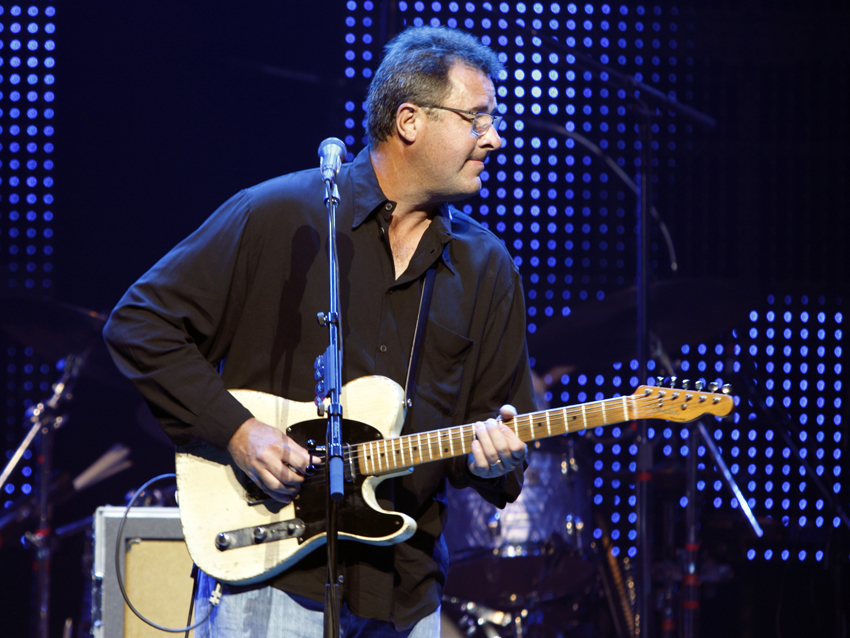
Vince Gill talks guitars, Paul Franklin and their album Bakersfield
Decades before Vince Gill’s country-pop smash When I Call Your Name put his name on the lips of country fans, Chet Atkins parlayed his own upscale country-jazz wizardry into highly respectable album sales. And in the years since Gill minted his megastardom, a handful of other hot country acts with hot licks have come along, first Brad Paisley and Keith Urban, and more recently Hunter Hayes and Charlie Worsham.
But at this point, Gill is the only modern guitar hero with his bronzed likeness hanging in the Country Music Hall of Fame, a custom-built studio at home, and his chops and creative drive still intact. So it’s not exactly like there’s a well-worn path for the 56-year-old, singing, songwriting and guitar-playing Nashville fixture to follow.
What Gill has done over the past decade is deliver one surprise after another, like his intentionally eclectic four-disc set These Days, his contributions to western-swing band the Time Jumpers, of which he’s a bona fide member, and the producing and playing he’s done on albums by everybody from LeAnn Rimes and Ashley Monroe to Joe Bonamassa, Johnny Winter, Lee Ritenour, Sonny Landreth, Little Feat, Alice Cooper and Atkins disciple Earl Klugh. The latest entry on the list is Bakersfield, the hard-grooving, honky-tonk collection of Merle Haggard and Buck Owens covers Gill and steel guitar studio great Paul Franklin released last year and just reissued with four additional tracks. (Click here at the Cracker Barrel Old Country Store to purchase the Expanded Edition of Bakersfield.)
Gill has done his share of dueting, starring opposite Reba McEntire in a mini-movie of a music video for The Heart Won’t Lie, and harmonizing with such formidable country and pop voices as Patty Loveless, Kelly Clarkson and his wife, Amy Grant. But he’d never recorded an entire album’s worth of duets until Bakersfield. The fact that he tapped an instrumentalist instead of a vocalist to be his duet partner says a lot about his current priorities. (Hint: letting an inspired solo extend beyond eight bars is a whole lot higher on the list than chasing chart success.)
One other unusual thing about Gill? It was his choice to call up bright and early on a Monday morning and talk with MusicRadar about what he’s been up to between scouring liner notes for his favorite players’ names as a kid in Oklahoma and spotlighting some of those game-changers with Bakersfield.
Did the four songs you added to the Bakersfield reissue come from the original sessions, or did you have to go back in and cut more?
“We went back in to cut some more. It was fun, because it gave us a chance to revisit a couple of songs we’d talked about. Paul wanted to do I Threw Away The Roses. He said that was always his favorite. Another Buck song that I didn’t know that good was Tender Loving Care. I heard it again and I said, ‘I could sing that one. And being a ballad, it’d be great for Paul to annihilate,’ which he did. It has that great conversation between us, me on guitar and him playing the steel.
"I’d always wanted to do High On A Hilltop. That’s always been one of my favorite songs, period. I really didn’t associate that song with either Buck or Merle. That one I learned first from the bluegrass world. And come to find out it was recorded by both Buck and Merle and written by the great Tom Collins… I think the outro is two and half minutes long, or something like that. It’s as long as the rest of the song. Paul just weaves in and out and just destroys it."
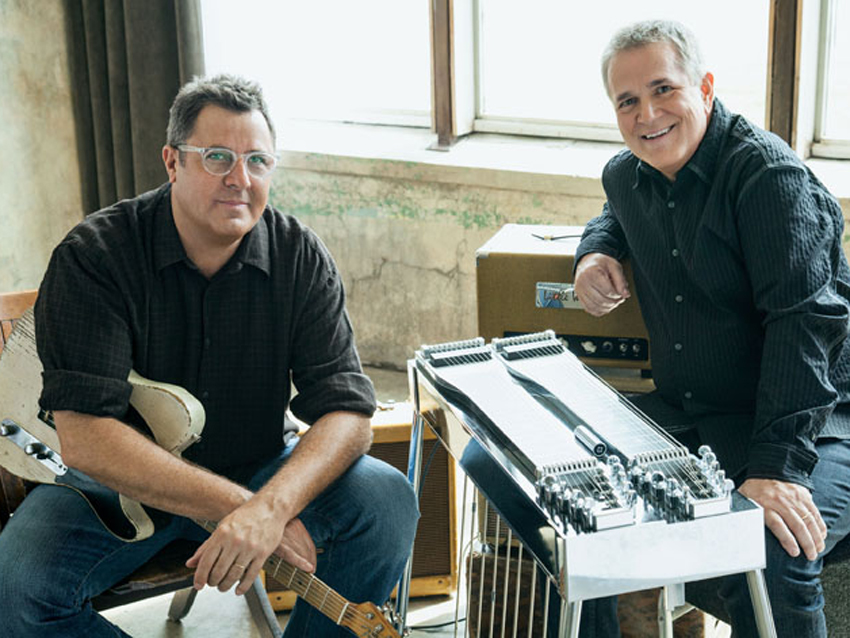
Vince Gill talks guitars, Paul Franklin and their album Bakersfield
“When we first envisioned doing this record, we talked about an instrumental record. We both decided that didn’t hold a ton of interest [for either of us]. But we could at least do one instrumental, since we’ve got the luxury of these extra tracks. I had this song sitting around that I had written as an instrumental. It was really a bluegrass guitar instrumental, the way it was written.
“So I pulled out my Telecaster and started messing with it and said, ‘Man, this could be pretty neat.’ It’s the one time on the record when [Paul and I] both are kinda blazing and playing fast. I never had a title for that song. I figured it’d be a great opportunity to just call it, ‘Buckin’ Merle.’”
It seems like you and Paul got just as into revisiting the sounds and techniques of the Bakersfield country scene – say, the Telecaster attack of James Burton or Don Rich – as the songs themselves.
“I think that not only did we get to honor Buck and Merle, but all the elements that helped make their music stand out like it did. It was those guys. It was guys like Don Rich and James Burton and Ralph Mooney and Roy Nichols. They were as integral a part of the inspiration.”
James Burton switched out the heavy strings his Telecaster came with for considerably lighter banjo strings. What difference did that particular innovation make?
“He put these light strings on there, and he could pull on ‘em and bend ‘em with his left hand in a way that, to me, as much as anything, it emulated the steel guitar. He could then play licks by bending the strings in the same way that the pedals on the steel guitar bend the guitar up and down.”
Something small can have a tremendous impact on the sound and capabilities of an instrument.
“Yeah. The [country] session players like, in that day, Leon Rhodes and Hank Garland and Jimmy Bryant, they were all playing fast. None of them were really bending strings like a blues player would. It seems like the blues players were the first ones to start bending the strings. Even the earliest blues players were playing with a bottleneck or something to make that sliding thing, make it bluesy. Even in rock ‘n’ roll in the ‘50s, nobody was really bending strings that much. Chuck Berry a little bit. Just a little bit. Watching it all evolve was pretty interesting.”
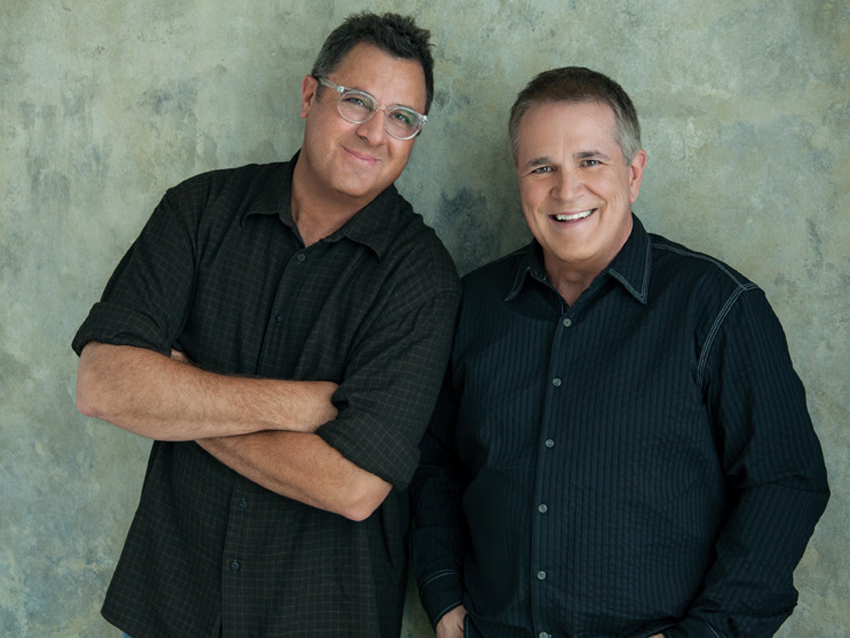
Vince Gill talks guitars, Paul Franklin and their album Bakersfield
One of your main axes is a ’53 Telecaster. Is it safe to assume that that’s what you played on much of Bakersfield?
“Yeah. There were a few others. I probably played a half a dozen different Telecasters on that record. [The ‘53] is always the one that outdoes them all, that I just like the best. It sounds the most familiar to me. It feels the most forgiving, the most connected. Because it’s mine and I’ve played it for 35 years is why I’m connected to it. It’s miraculous to me that you can pick up 10 of those guitars, built in the same year, and they don’t sound exactly alike and they don’t play exactly alike. You’d think an electric guitar sounds like an electric guitar, but it doesn’t. And that one is really kind of magical.”
The fact that you and Paul Franklin have equal billing on this album, and that you’ve written and recorded a tribute to your longtime steel guitarist, the song Buttermilk John, suggests that you recognize the role sidemen play in defining a sound. When did you first wrap you head around the idea that the players, and not just the star, are essential?
“I’ve gotta tell ya, I think I was always drawn to that side of it, because I was a musician. It took me a long time to get up the courage to sing. I think as much as I loved Buck Owens, I was just as drawn to what Don Rich did and what Tom Brumley did, the lead instruments. I always aspired more to be a sideman and a session guy than I ever did an artist. I wanted to be in bands. I wanted to be the guitar player. I wanted to be the whatever player. In all my earliest jobs, I was a band member. I was the lead guitar player. I was the harmony singer with Rodney [Crowell]. Even with Pure Prairie, I sang lead on the songs, but I was lead guitar player and everything before that.
“As a young 7th grader, 8th grader, I remember just reading the back of records and going, ‘How does this work? How do they all do this?’ And I would notice all those names. And then I found myself buying records of people I’d never heard of, because I’d look on there and see one of my favorite guitar players, like Larry Carlton or somebody I was really crazy about. I said, ‘I’d like to hear what he played on this record.’ I would stumble onto artists that way.
“I did the same thing in an artist career for myself; I kinda stumbled into it. I found myself in between jobs. I started writing songs, and I’d written some songs and was singing. I said, ‘Well, maybe I could be an artist.’ So I tried. And it worked. It wasn’t always my first focus. I wasn’t the kid that sat in the mirror with a hairbrush practicing my Elvis moves.” [Laughs]
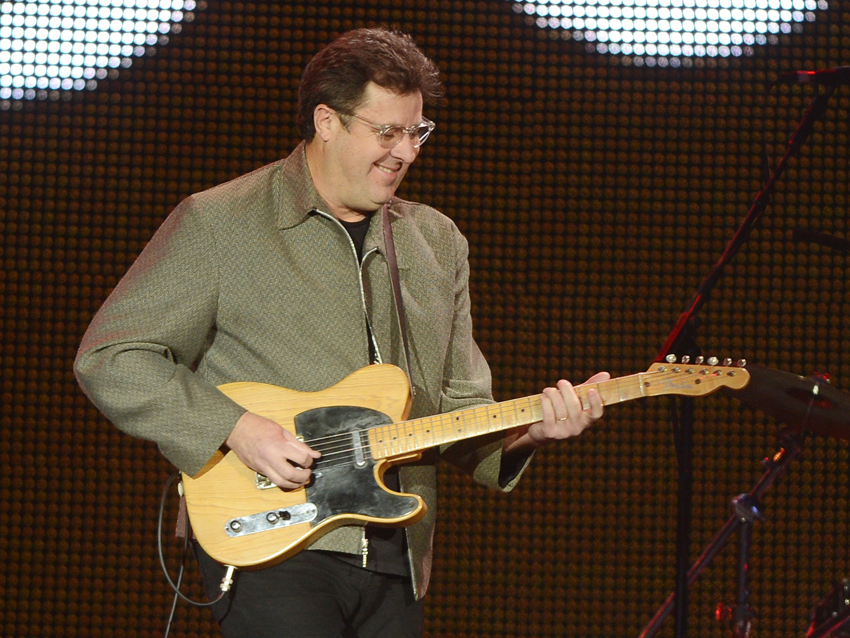
Vince Gill talks guitars, Paul Franklin and their album Bakersfield
There are YouTube clips of you playing in dozens of different styles in different band settings. Plus you’ve made an album, These Days, with separate discs devoted to bluegrass, straight-ahead country, rock and blues-pop ballads. I get the sense that you feel the sophistication of country guitar playing is on par with that of all these other genres of music. Am I right about that?
“Yeah. I think people perceive it as though it’s simple and it’s easy. And to some degree it is simple, but that doesn’t make it easy to play. It’s hard to take something that simple and make it interesting, and make it dance and all that stuff. As I look through my history, I think it bears that out. I’ve been a musician first.
“That was the whole impetus behind this [album]. I said, ‘I want to make a duet record with Paul, because he’s a musician.’ That makes the most sense to me, rather than [dueting with] another popular singer. I’ve done hundreds of those. I never made a guitar record, that is, an instrumental record, to prove I could play. I play what I do on all these records, a little bit here, a little bit there.”
With sensibilities so broad, can you put your finger on what you find satisfying to play?
“I think what satisfies me most is authenticity. If I’m playing on a bluegrass record, I want it to be authentic. It doesn’t need to ring of me. It needs to ring of what really honors that music. That’s all I’m ever trying to do, is play what fits and what I feel the sensibilities are of that music. There’s nothing worse than when you hear somebody playing blues licks over changes that aren’t really bluesy
“I like to search for brevity, in that I like space. That’s a hard thing to get to. You always start out playing too much. Years ago, I was doing one of my very first sessions, and I played and the talkback came on and the producer said, ‘OK, that was great. This time play me half of what you played.’ It was just a great lesson, to think that you say the most with the least oftentimes.”
You’ve said you still feel driven to push yourself as a singer and guitarist and make the most of the music-making years you have left. How is that translating into your decision making, what you’re pursuing and saying yes to, what you’re doing to stay sharp, what you’re striving for as a player?
“Really, I don’t know that I have a master plan. [Laughs] I kinda scratch whatever itch is irritated the most. I’m still just driven to get better. It’s really that simple. Just want to see myself improve and be better at what it is that I’m doing. I know there will come a point when it starts to tilt the other way, and that will probably be health-driven, and arthritis-driven. Whatever it’s gonna be, something’s gonna take us all down.” [Laughs]
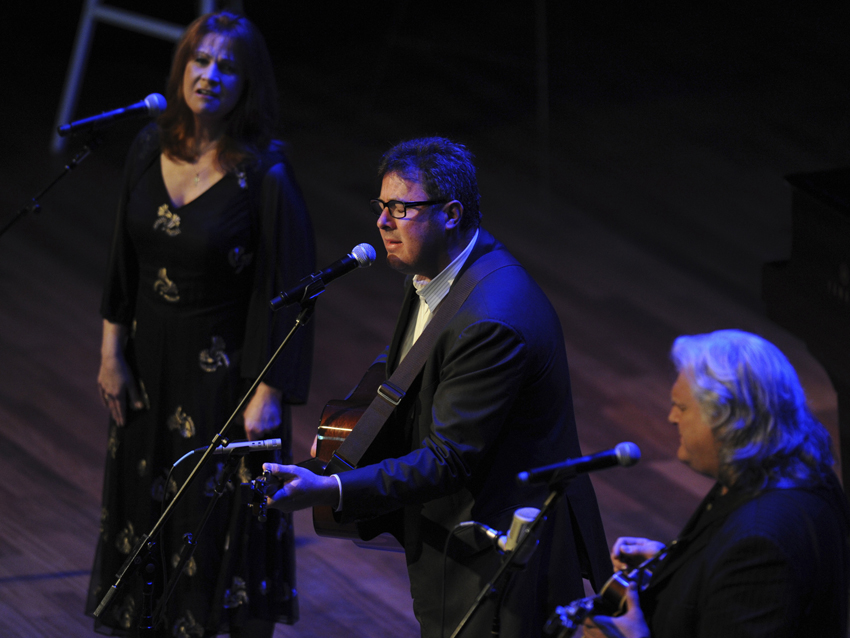
Vince Gill talks guitars, Paul Franklin and their album Bakersfield
During that period of your career when you were charting blockbuster singles, you were recognized for the singing more than the playing.
“Sure.”
So many of the guest spots that have come your way in the past decade have been guitar-centric, invitations to every single edition of Eric Clapton’s Crossroads Guitar Festival and to play on albums by Johnny Winter, Alice Cooper, Earl Klugh, Little Feat and others. You’ve also brought guitar to the forefront on your own recording projects, with Guitar Slinger and Bakersfield. Do you think the perception of what you do has changed?
“I think probably that’s true. I knew going in what my best asset was to have an impact, and that was singing. I got that early on, and I think, hopefully, I was wise enough to center most things on that. And on songs. I think I also have a great grasp on the fact that one of the things that makes James Taylor and Paul Simon and The Beatles and Merle Haggard great is that legacy of songs… A time or two, they were great vehicles to show my playing, like a song like Liza Jane or Oklahoma Borderline.
“I think you wind up getting what you need. As they quit playing me on radio and turned their back to me in that world, so to speak, those were things that fulfilled what I needed. That call coming from Eric to come play at that festival had a huge impact on me: ‘Oh man, did I need this.’ There’s a guy that whatever it was that I did, he saw what I really was, which was a musician, and that spoke volumes. That was probably a big reason that I got connected to a whole bunch of these other folks.
“Before I had any hits, Mark Knopfler recognized a musician in me and asked me to be in Dire Straits. I turned it down, because I didn’t want to feel like I’d failed at country music. At the time, I could’ve sure used the money and could’ve sure used a good gig. But all along, I think I’ve had a good head on my shoulders of what I’ve always wanted to be and who I’ve always been. I don’t think I’ve changed much over the years.”
Speaking of vehicles for your playing, when you and Patty Loveless performed your song Go Rest High On That Mountain at George Jones’s funeral last year, there was a point when you were so overcome with emotion that you couldn’t sing anymore, and you turned to your guitar to express what you were feeling.
“Yeah, that was an emotional moment… Part of it was obviously the moment and the hurt of losing a great old friend. But the passing of someone that so dearly loved great traditional country music, at a time when there isn’t very much of it at all, you kind of know that there was a part of him that died with a broken heart. We started playing that song, and Patty started singing with me, and it was as much just our voices together that undid me. And then once I was gone, I was gone. It’s hard to get back. Every now and then that song just destroys me to have to sing it. There’s a side of me that doesn’t want to have to sing it again.” [Laughs]
Even when your voice fails, you’re still an articulate guitarist.
“It bought me some time, you know, to gather myself. What I’ve always loved about great guitar playing is, it’s just as emotional as words. Words don’t get to be the only thing that has emotion. It’s coming from the same well. I’ve always tried to play what I would sing and sing what I would play.”